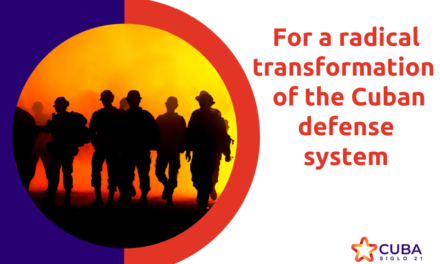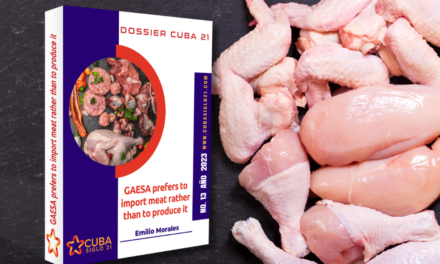Descargar Dossier completo
Download English Dossier
Executive Summary
Narco-dictator Nicolás Maduro is now a fugitive from US justice. In Caracas, a path could open up for the transfer of power to the legitimately elected president on July 28, 2024. But the big question is another. If a transition to democracy in Venezuela were to materialize first, what can be expected to happen to Cuba, the other head of the two-headed hydra known as the Cartel of the Suns?
The Cuban state has become a mafia-like actor operating at the heart of a transnational criminal network. Unlike traditional dictatorships, a mafia state merges political, military, and economic power into a structure designed not to serve the nation, but to protect and enrich an elite. In the case of Cuba, this model was consolidated through GAESA, the conglomerate controlled by the Castro family and some members of the military leadership, which manages most of the country’s strategic and financial sectors with total impunity and without audits.
Cuba’s unique contribution to regional organized crime has been its strategic, military, and ideological advice in the creation and consolidation of the Cartel de los Soles (Cartel of the Suns), a drug trafficking organization that emerged in Venezuela. After Hugo Chávez came to power, Fidel Castro saw an opportunity to shield his own regime and expand his influence. Since then, Havana has infiltrated and controlled Venezuela’s intelligence services and military apparatus, ensuring the armed forces’ loyalty to Chavismo and facilitating Venezuela’s transformation into the main center of international narco-terrorism in the Western Hemisphere.
The Cartel de los Soles was born and grew under this Cuban guidance. Havana contributed its expertise in intelligence, propaganda, repression, and social control, while Caracas provided its vast oil resources and strategic geographical position. This symbiosis, dubbed by some as Cubazuela, constitutes a two-headed mafia state in which Cuba plays the role of guardian and guarantor of its internal security. Cuban advice has not only shielded the Venezuelan regime from internal rebellions. It has also allowed the Cartel of the Suns to initiate and consolidate alliances with international actors with whom Venezuela had no significant ties before Chávez, such as Russia, Iran, and China. Added to this are its connections with terrorist organizations such as the FARC and the ELN, as well as with Mexican drug cartels.
Cuba, within the criminal ecosystem of the Cartel of the Suns, has specialized in three areas:
- Sanctuary, protection, and advice: it offers sanctuary to narco-terrorists and criminals, as well as advice and training in intelligence and counterintelligence, trains repressive forces, and designs strategies to crush protests and opponents.
- Human trafficking and slave labor: the business of exporting doctors is a modern trafficking scheme that has brought tens of billions of dollars to GAESA. Some recent regional mass exoduses have been fostered and exploited between Cuba, Nicaragua, and Mexican cartels for their benefit.
- Money laundering: It uses the hotel real estate industry, front companies abroad, and financial triangulation via GAESA’s CIMEX-Panama to launder its own and others’ capital.
All of this makes the island a key link in the Cartel de los Soles, not as a drug producer, but as a strategic partner. Havana provides financial, logistical, and intelligence infrastructure that ensures the cartel’s global operations and expansion. Without Cuba, the Venezuelan network would lack the international advice and protection that has allowed it to emerge, survive sanctions, and overcome internal political crises.
GAESA and the Cuban mafia state must be treated as an integral part of transnational organized crime. Cuba’s links to the Cartel de los Soles are not an isolated incident, but rather the centerpiece in the origin and growth of a criminal ecosystem that threatens democracy and regional security. In this regard, the text proposes that the international community recognize these criminal states—Venezuela, Nicaragua, and Cuba—as illegitimate, without the right to claim sovereignty in the international system, and confront them for what they are: transnational organized crime structures that have taken over the state institutions and main wealth of these countries and put them to work for their own benefit, usurping national sovereignty.
Conclusions and recommendations
- Distinguishing mafia states and narco-terrorist criminal states—which by their very nature lack the rights that correspond to sovereign states in the international community—as legitimate targets. The emergence of mafia states, as well as their association in cartels with other organizations and states that engage in terrorism and a wide range of criminal activities, is an unfortunate but undeniable fact of the 21st century. Today, they pose a real threat to democracy and stability in the region.
- The Cuban mafia state is an integral part of the regional criminal system. This includes, first and foremost, the Cartel of the Suns, which emerged under the protection of its political, diplomatic, military, and intelligence support for Hugo Chávez. Cuba is part of this transnational cartel, whose birth and rise it sponsored alongside Venezuela. Today, the Cuban mafia elite participates in key areas of this criminal ecosystem: a) human trafficking, b) slave labor, c) asset protection and money laundering, d) mercenary provision of intelligence and counterintelligence advisors, e) serving as a sanctuary for the physical protection of narco-terrorism leaders and their businesses, f) provision of its espionage networks and experts for infiltration services, as well as g) diplomatic influence in international organizations and producing and disseminating propaganda worldwide.
- Mafia and criminal states cannot claim sovereignty for themselves when they usurped it from legitimate states. Their criminal activities, such as drug trafficking, can be considered attacks on legitimate states in the international system, which can invoke their right to self-defense under Article 51 of the UN Charter.
- Cuba sponsored and facilitated the creation of the Cartel de los Soles and has been its military guarantor in Venezuela, just as it has protected the Ortega criminal regime in Nicaragua. GAESA is part of this international criminal network and, as such, its assets and financial operations, whether direct or indirect through companies and banks managed by front men in the US and other Western countries, must be investigated by the US Department of Justice and Treasury. GAESA’s activities must be investigated not only because they are likely to violate embargo sanctions but also, considering the Racketeer Influenced and Corrupt Organizations Act (RICO), as part of a transnational organized crime scheme.
- An executive at any level, before deciding on any important issue, must evaluate the costs that it could entail; similarly, he or she is obliged to consider the costs of not making it. The U.S. military deployment in the Caribbean and off the coast of Venezuela is not a political marketing stunt. It is an effort explicitly committed to capture Maduro, something that would facilitate the start of a transition under the leadership of the winners of the July 28, 2024, elections: Edmundo González and María Corina Machado. This does not mean the massive invasion and occupation of Venezuela, but rather the efficient use of the technological and human resources that have already been mobilized. Any outcome below this minimum expectation, which the US government itself has set, would have a negative global and national impact on the credibility of the current administration and would also have a negative impact on the electorate, especially the very decisive Florida electorate, during next year’s elections.
- A victory in Venezuela would be internationally equivalent to the fall of the Berlin Wall in the Western Hemisphere. The fall of the Cuban regime would be comparable to that of the USSR. It could also be seen as a major victory on two domestic issues that mobilized the electorate in 2024: drug trafficking and mass illegal immigration. In this case, it would constitute a significant defeat for drug trafficking, which attacks the United States daily. Rather than returning Venezuelan migrants to their country, the US would assist in giving them back their country, which they could then rebuild with international aid.
- Those who oppose any “regime change” action in Washington’s foreign policy often confuse regime with government, lumping together very different situations and countries, ignoring cases where change was successfully achieved, and above all omitting from their analysis the price that the US and its allies have paid for refraining from acting in some other cases. They also prefer to forget that the American Revolution of 1776—an indisputable and radical regime change—received broad and decisive external support from the kings of France and Spain in the form of finances, combatants, ships, and other resources.
- The principles that distinguish successful regime changes include the following: a) supporting the leadership of a significant, endogenous movement that seeks change, without giving in to the temptation to appoint or orchestrate it from outside; b) not giving in to the temptation to negotiate with the government of the regime that is seeking to change a partial modification of the current system in exchange for extending its hold on power.







